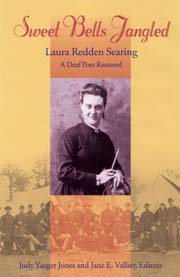Laura Redden Searing
A Deaf Poet Restored
Judy Yaeger Jones and
Jane E. Vallier, Editors
|
View the table of contents. Read an excerpt. Read reviews: The Women’s Review of Books, The Forum, Whistling Shade, Disability Studies Quarterly. |
$34.50s print edition $34.50 e-book |
Gallaudet Classics in Deaf Studies, Volume 4
From Whistling Shade
Judy Yaeger Jones, a member of MISF, stumbled onto the story of Laura Redden Searing while she was a project director for Minnesota Women’s History Month. It turns out that Glyndon, Minnesota (in the Red River valley) was named for Howard Glyndon—the pen name of Laura Redden Searing. (Glyndon is, in fact, the only town in the United States named for a woman writer during her lifetime.) Jones’s research eventually became this book: she recounts the details of Redden’s life in an introductory essay, “A Brief Biography of Laura Redden Searing.” Glyndon, Minnesota, a small town not far from Fargo, owes its name to a curious history. A railroad town founded by a Civil War veteran, it was named after poet and journalist Howard Glyndon, who, it turns out, was the pen name of Laura Redden Searing, one of those faded mid-19th century bards whose verses bring to mind rosewater and hoop skirts. Those poems have been unearthed and set against the context of the author’s life in the new collection Sweet Bells Jangled—Laura Redden Searing, a Deaf Poet Restored, edited by Judy Yaeger Jones and Jane E. Vallier.
A deaf poet—let’s start there. Redden, born in 1839, was left deaf by “brain fever”, probably spinal meningitis, at the age of twelve. Add to that the murder of her father in 1848, and her job as a Civil War correspondent, and you have a pretty grim youth. As Vallier writes in her introductory essay, “Before the poet can sing, speak, or write she must be wounded beyond the imagination of her readers.” Redden definitely qualified.
A star pupil at the Missouri School for the Deaf, she found in writing a way to communicate with the world that for her had fallen silent. While in school, she submitted articles to the St. Louis Republican, who recognized her talent and sent her to Washington in 1861 to cover the war. She was pro-Union, as her poems from that period attest. She published a collection of them under the title Idyls of Battle and Poems of the Rebellion (1864) that may have been the first book of poems about the war. Containing odes to Fredericksburg and Gettysburg, and a heroic profile of Grant, it is not surprising that President Lincoln was one of her admirers. But most of the poems are domestic in nature, a woman’s lament for a lover dead or absent. Though they are the typical 19th century fare of rhyme-and-meter melodrama, Redden’s craftsmanship is evident, and in some stanzas you feel the heavy pull of history, the act of witnessing something that the best poems have. From “In Time of War”:
There are white faces in each sunny street,
And signs of trouble met us everywhere;
A nation’s pulse hath an unsteady beat,
For scents of battle foul the summer air.
As the Civil War wound down, further adventures awaited our poet. Redden toured Europe in 1865, and in Capri fell in love with Irish artist Michael George Brennan. Their unhappy romance (he died four years later) was to form the backdrop of her poetic masterpiece. A long romantic poem set in seventy parts, Sweet Bells Jangled (1874) is surprisingly forward-looking for its time. The sections alternate between lyrics of various meter and a prosaic narrative that barely one generation after Whitman gives the illusion of a 20th century artist trapped in the 19th:
I’m sick of hearing so much about love!
I can’t take up a magazine or journal
But ’t is the same old story,—Love! Love! Love!
Whether in poem, prose, essay, or tale;
And all my music’s set to silly words.
Redden went on to become a wife (to Edward Searing, who she later divorced) and a mother. She did not, however, build on the artistic breakthrough of Sweet Bells Jangled. Though some of her later poems (“At the Grave of Keats”, “The Hills of Santa Cruz”) exhibit the fine tuning of Swinburne and were praised by Whittier, they give no hint of the poetic revolution that was just around the bend of the 20th century.
It seems strange that the period of the Civil War, when poetry would seem most needed, coincided with a great dearth of poetic genius in America. Between Whitman and Longfellow on the one side and Robinson and Masters on the other, only Emily Dickenson is still widely read, and she spent the most isolated of lives. But perhaps that’s what war does to art—it jangles the sweet bells, and deafens the poet. Even so, Sweet Bells Jangled is a fascinating read, enlightened by the capable scholarship of Jones and Vallier. The town of Glyndon should be proud.
Judy Yaeger Jones is an independent scholar and educational consultant in multicultural, disability, and women’s history in St. Paul, MN.
Jane E. Vallier is an adjunct assistant professor in the Department of English at Iowa State University.
Print Edition: ISBN 978-1-56368-138-7, 6 x 9 paperback, 224 pages
$34.50s
E-book: ISBN 978-1-56368-268-1
$34.50
To order by mail, print our Order Form or call:TEL 1-800-621-2736; (773) 568-1550 8 am - 5 pm CST
TTY 1-888-630-9347
FAX 1-800-621-8476; (773) 660-2235

